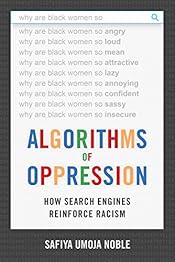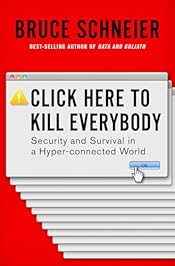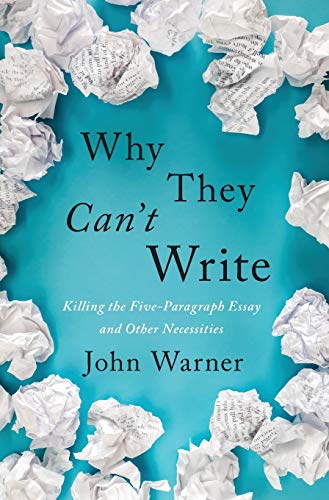I posted this top ten list over at Inside Higher Ed. I’ll be adding my traditional top ten in crime fiction before too long.
 Yochai Benkler, Robert Faris, and Harold Roberts Network Propaganda: Manipulation, Disinformation, and Radicalization in American Poltiics (Oxford).
Yochai Benkler, Robert Faris, and Harold Roberts Network Propaganda: Manipulation, Disinformation, and Radicalization in American Poltiics (Oxford).
A thorough examination of the ways technology has been used in recent months to shape our political culture and influence events, based on an analysis of millions of stories posted and shared on networks in three decisive years. I haven’t finished reading it yet, but it’s a lucid, fascinating explanation of how these networks operate and how our news environment has split into two distinct spheres, contributing to polarization and radicalization. If your library’s copy is checked out, you can read the open access version.

James Bridle The New Dark Age: Technology and the End of the Future (Verso).
A conceptual artist and writer grapples with what is happening with our technology and how it seems to have taken on a complex life of its own, fed by a toxic dump of extracted data and algorithms that nobody really understands. Solutions aren’t what Bridle is after. Rather, he challenges us to consider how we’re going to live with tech we can no longer understand or control. Reviewed here.

Virginia Eubanks Automating Inequality: How High-Tech Tools Profile, Police, and Punish the Poor (St. Martin’s).
An excellent, highly readable, and meticulous investigation into the ways automation of public services has penalized the poor, sometimes as part of an austerity regime, sometimes simply good intentions gone awry. It does a great job of showing why we need to pay attention to economic and political systems that keep so many people just one medical emergency or job loss from isolating, humiliating, quantified poverty. Reviewed here.

Tarleton Gillespie Custodians of the Internet: Platforms, Content Moderation, and the Hidden Decisions that Shape Social Media (Yale).
It may seem nobody’s minding the social media shop, but in fact moderation is a core feature of all content platforms. It just doesn’t work very well in far too many cases. Gillespie delves into how these systems work, how people influence them, what happens when the economics of popularity rules, and what we need to do to make systems less biased and more responsive to users’ interests. Reviewed here.

Adam Greenfield Radical Technologies: The Design of Everyday Life (Verso).
A remarkable book, both for the way it so clearly talks about complicated things like cryptocurrency, machine learning, and artificial intelligence while also explaining things we think we know, like phones and those internet-connected things that increasingly turn up in our homes. This book examines how they work and what effect they will have on our everyday lives and how we need to make sure these technologies don’t simply reify existing power structures and the concentration of wealth. Good stuff. Reviewed here.

Eric Klinenberg Palaces for the People: How Social Infrastructure Can Help Fights Inequality, Polarization, and the Decline of Public Life (Crown).
Just as Greenfield examines the ways technology influences our lives and argues for more thoughtful, egalitarian design principles, Klinenberg argues that we shouldn’t spend a dime on infrastructure without considering how it can promote social cohesion and healthy places where people can thrive. I especially enjoyed reading about a branch of the New York Public Library system that he and his students studied, but he also talks about how housing, schools, health care, and designing for climate change can incorporate features that will enhance social infrastructure. reviewed here.

Safiya Noble Algorithms of Oppression: How Search Engines Reinforce Racism (NYU).
Over several years, Noble studied the ways Google searches presented information to people, finding that the racism in our society is reflected and even amplified in tools we use every day that are supposedly neutral because they are run by code, not people. In fact, algorithms reflect the biases of their creators and are loaded with power. Though tracking racist results is difficult because algorithms are tweaked constantly, and problems erased when unfortunate results hit the news, she makes a good case against leaving the control of such important tools in the hands of megacorporations that just don’t seem to get the problem or have solutions. Reviewed here.

Susan Orlean The Library Book (Simon and Schuster).
By the author of The Orchid Thief, Orlean tells the history of the Los Angeles Public Library and delves into the mystery of who tried to burn it down in 1986. She’s an easy-going writer who can explain a lot about arson investigations as well as how a public library operates, now and in the past. I noted this quote down: “A library is a good place to soften solitude; a place where you can feel part of a conversation that has gone on for hundreds of years even when you’re all alone.” I didn’t write a review, but Joshua Kim did.

Bruce Schneier Click Here to Kill Everybody: Security and Survival in a Hyper-Connected World (Norton)
A thorough look at the consequences of using poorly-designed and insecure technology and the public policies that fail to keep us all safe. Though not as riveting for me as his previous book, Data and Goliath (simply because I’m more interested in privacy than in network security) Schneier once again makes a complex issue clear and offers workable if ambitious solutions. Reviewed here.
Siva Viadhyanathan Anti-Social Media: How Facebook Disconnects Us and Undermines Democracy (Oxford).
This book couldn’t be more timely, and though you could argue it was out of date before it left the printer’s, given how much Facebook has been in the news, it’s an excellent overview of how Facebook operates and why it has such an impact in the world. As Vaidhyanathan writes, “If you wanted to build a machine that would distribute propaganda to millions of people, distract them from important issues, energize hatred and bigotry, erode social trust, undermine journalism, foster doubts about science, and engage in massive surveillance all at once, you would make something a lot like Facebook.” Reviewed here.

Okay, one more. Though it’s not focused on libraries or technology per se, John Warner’s Why They Can’t Write (reviewed here) includes fascinating context for the ways the ed tech industry influences higher education and the writing classroom and how to set students up for authentic inquiry rather than impersonating an academic voice and sweating the details of MLA format.